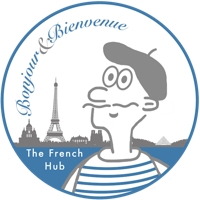Setting a personal objective to learn a foreign language is a noble task indeed. In today’s international economy and global mobility, one must wonder if there is a more important personal skill than speaking another language. French is a good choice. More than just the language of love, French is the language of diplomacy, the language of the Olympics, the language of the arts and on its way to become the most spoken language in the world by 2050 thanks to the rapid expansion of the African continent. While very exciting and empowering, picking up French is not an easy feat nor a short endeavor, making the adventure even more rewarding. The journey ahead is full of obstacles and hurdles, mostly psychological however.
With more than 15 nationalities studying French with us, we see first hand that the main challenges have very little to do with cultural background, native language or even the intrinsic complexity of the French language – a constant balance between rules and exceptions! No, the main obstacle to learning French is the quality of the approach chosen and how it meets four critical components. Let’s take a closer look.
Expectation
As you embark on a personal mission to learn French the very first component to success is personal expectations. They must be set. They must be measurable. They must be achievable. They must be focused. I am very honest in my discussions with prospective students who seek some level of fluency within eight hours of class, or with students who want to engage in political debate after just a few weeks. It-is-just-not-going-to-happen. Ever. One may ask why we offer an eight hours package then? We call it the “curious” package. Eight hours is long enough to help you gauge your interest in learning French, but if you are truly serious you must consider a yearly commitment. This is enough time to help you build a foundation so you can truly enjoy the language and objectively measure your own progress. For this commitment to be justified however, you need to have a specific focus in mind. Are you learning French to impress a spouse or communicate with in-laws? Are you learning to travel or relocate? Better still, you want your children to have this extra edge in life early on? Whichever it is, having a specific focus to hang on to and to help you (and us) refine your learning experience is paramount. Write down your expectations, and come back to them monthly or quarterly. If you are not making objective progress towards them, the approach may be missing another component.
Repetition
This is the simplest component of them all, yet the most underutilized. Consider this: did you learn your native language going though grammar books? Nobody did. We learned through trial and error, constantly hearing sounds associated with actions, situations, conditions which we learned to reproduce. This repetitive process constitutes the most powerful solution to establishing a healthy linguistic foundation. Put away those grammar books for now. They are the main reason why people give up on learning a foreign language. If only I had a penny for every student I met with a good grammar foundation but who cannot speak or understand the most basic French! The best start to your linguistic journey is to find and create opportunities to train your listening and speaking abilities. Simple options include watching movies and series, or browsing French TV programs (e.g. daily news) online. You need to associate visual situations with repeated sounds. Pay particular attention to the context – funny, sad, formal, friendly situations. And if you don’t have a friendly francophone to practice with? Simply turn on Siri on your phone or tablet to French and speak. Ask her questions about today’s news, the movie, the program you just watched. She can be your best friend until you find a French best friend. She is also unforgiving and will let you know she did not understand. And remember, there is no point to be shy practicing your French in class or in a discussion group.
Immersion
There is no better option to learn French than to live in France. But this is obviously not an option for many. There are some good alternatives however. First, look for a French cultural center or language school. A French cultural center is preferred, as it brings a demographic mix of francophones and francophiles not to be found in a French language school. A French cultural center also adds a cultural dimension to the learning experience through events from gastronomy to thematic classes. Culture and language have a lot of dependencies, explore and discover! A language school is focused on learning the language. Fine, but remember the comments about grammar books. Enjoying the language is developing the ability to understand and speak, not to conjugate perfectly. Always prefer conversational over theoretical French for more personal enrichment. Also look for francophone or francophile discussion and meet up groups. Attend, listen and practice. Lastly, an often left out component of immersion is surrounding yourself with the culture, creating a mini French cultural oasis at home. I am not suggesting heavy home remodeling for a French Provence style, but rather a comfortable space where you can relax, watch a French movie, listen to a French song, browse through a French magazine while tasting a new sweet French wine, all this as a French pôt-au-feu (beef and carrots) slowly cooks in the oven. Feeling there, is the first step to being there.
A Secret Ingredient?
Expectation, repetition and immersion. These are the three fundamental components to successfully learning French, or any other language. Yet, without a fourth ingredient, none of them matter. Hmmm. Let’s not build up more pressure than necessary. The fourth ingredient … is … fun. Your linguistic journey has to be fun. Why spend time setting expectations for something that isn’t fun? Why practice something over and over if it isn’t fun? Why immerse yourself into something that isn’t fun? It all boils down to this: the approach you choose to follow has to be fun. Steer away from book-based methodologies using Jean-Vincent and his dog Médor. The dog may be fun, but the methodology probably isn’t. Don’t order books and conjugate at home in isolation. It isn’t fun. You will give up on French because of the approach, not the complexity of the language. Get out there, join a conversational class which uses real life topics and daily life events as a learning tool. Go to French events to mingle, watch funny movies or dramas if that is your definition of fun. Learning a language is learning to communicate with others and developing the ability to appreciate and value each other’s cultural similarities and differences. It opens our eyes to the world and give us a sense of belonging to something greater. The secret is not in grammar books.

